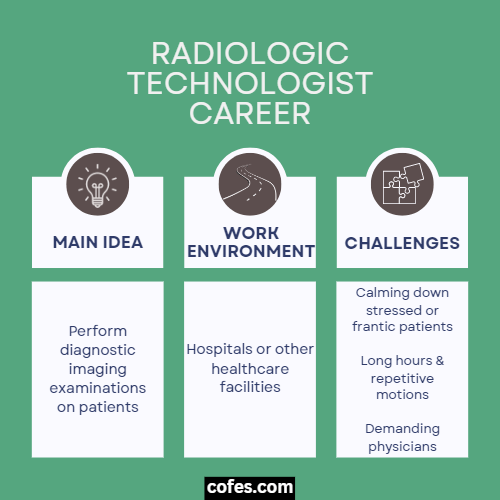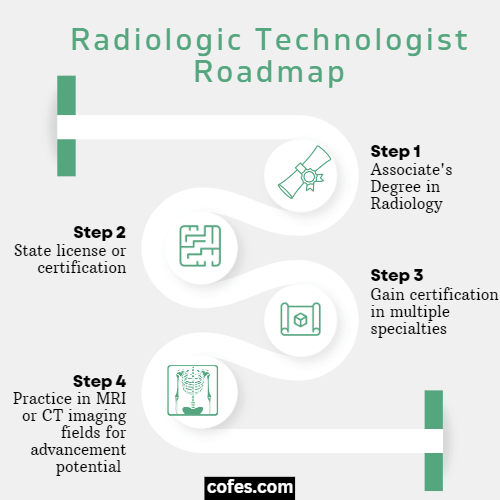Radiologic Technologists, also called radiographers, do much more than take X-rays of broken bones all day.
They can specialize in various areas, including magnetic resonance imaging (MRI), sonography, and mammography, and are essential to assisting physicians in diagnosing and treating patients.
Even though they are often left behind the scenes within the healthcare industry,
Radiologic Technologist is one of the most in-demand jobs available today.
Radiologic Technologist Job Information
| Official Job Title | Radiologic Technologist |
| Average Salary | $61,370 |
| Stress Level | Above Average |
| Work/ Life | Average |
| Job Satisfaction | Low |
| Career Advancement | Average |
Radiologic Technologist Job Description
What Is A Radiologic Technologist?
Radiologic Technologists use expensive and complex equipment to take X-rays, scans, MRIs, and ultrasounds of patients to assist the physician in diagnosing and treating the patients.
They report their findings based on the images obtained to a Radiologist who analyzes the data.
Radiologic Technologists are specially trained to recognize a high-quality versus low-quality image, care for patients, and answer any questions regarding the procedure.

What Does A Radiologic Technologist Do On A Daily Basis?
As a Radiologic Technologist, you would work primarily in a medical or educational setting.
One of the most critical aspects of your daily work is ensuring the safety and protection of yourself and your patients by using the correct procedures and measures to protect them from harmful radiation from imaging equipment.
Radiologic Technicians provide the processes and care that can lead to the treatment and potential cure of patients, which may be a factor in the high-stress levels of this profession.
This is why it is essential to always provide the highest quality images to physicians.
Responsibilities, Duties & Roles Of A Radiologic Technologist
There are several elements you are in charge of as a Radiologic Technologist.
- Maintain and adequately operate expensive imaging equipment.
- Obtain clear images by following precise instructions.
- Prepare patients for the imaging procedure.
- Be knowledgeable enough to answer patient questions accurately.
- Play a role in working with physicians to determine a patient’s treatment plan.
Radiologic Technologist Salary
Average Salary
The national average annual salary for Radiologic Technologists is $61,370 in 2021.
This amount varies depending on the state and organization you work in.
Starting Salary
The salary for an entry-level position as a Radiologic Technologist typically starts at around $37,500.
Compensation tends to be higher for those working in outpatient care centers.
Senior Salary
Senior-level positions in this career start at an average of $83,265 across the United States.
How To Become A Radiologic Technologist
The Entry Level: Certification, Training & Degree
Several medical institutions require at least an Associate’s degree in Radiologic Technology.
You may also need to become licensed or certified by graduating from an accredited program, passing a certification exam, or obtaining certification from a credentialing organization like the American Registry of Radiologic Technologists.
Education programs can include academic and clinical work, depending on the specialization.
Some employers may also require their Radiologic Technologists to be certified in cardiopulmonary resuscitation (CPR) and essential life support in case of emergencies during imaging procedures.
You may advance your career by pursuing a Bachelor’s in Radiology, giving you access to supervisory or highly specialized positions.
Other Skill Sets, Requirements & Qualifications
Radiologic Technicians must be highly detail-oriented and good at following instructions precisely to obtain a clear image.
In addition, you must work with patients and calm them down when they are stressed or in pain.
You should also have advanced knowledge in mathematics to accurately calculate the amount of radiation or magnetic resonance used in imaging procedures.
How Long Does It Take To Become A Radiologic Technologist?
Unlike many other careers in healthcare, it doesn’t take long to become a Radiologic Technologist.
Some programs take just two years to complete, after which you can apply for the necessary certifications.
Is It Hard To Become A Radiologic Technologist?
A Radiologic Technologist is one of the more accessible careers in the healthcare industry to earn.
With a minimal amount of education and certification, you can become a Radiologic Technologist quickly, whereas most other careers in healthcare require several additional years of extensive education.
Radiologic Technologist Career Paths

The Radiologic Technologist Roadmap
There are several advancement opportunities for you as a Radiologic Technician.
This field can lead to specializations in MRI and CT imaging, mammography, and nuclear medicine.
Projections For Growth In Radiologic Technologist Jobs
The job outlook will increase by 6% through 2031.
Many of these jobs are expected to become available due to the need to replace workers exiting the labor force.
In addition, as the baby-boom population grows older, more Radiologic Technicians will be needed to maintain typical workloads as medical conditions increase in large aging generations.
In Summary: Is Radiologic Technologist A Good Career?
Despite its low satisfaction rating, most likely due to the hours and stressful nature of the job, Radiologic Technology can be an incredibly fascinating and rewarding career.
You get to view and study the human body without dealing with invasive procedures, and your observations and work lead to patients receiving the care they need to survive and care for their ailments.
Most Radiologic Technologists feel a sense of accomplishment and pride knowing they are helping their community become well.
Working Conditions
Can A Radiologic Technologist Work Remotely From Home?
Since Radiologic Technologists work with large, expensive magnetic equipment that uses harmful radiation, it is unlikely that you would be able to work remotely from home.
How Many Hours Does A Radiologic Technologist Work?
A regular 8-hour day, and a 40-hour week is typical for full-time Radiologic Technologists.
However, since imaging is sometimes needed in emergencies, you may be required to work occasional evenings, weekends, or overnight shifts.
Can A Radiologic Technologist Work Part-Time?
Most Radiologic Technologists work full-time, though some part-time positions are available within some organizations.
What Are The Average Vacation Days Of A Radiologic Technologist?
Jobs within the healthcare industry typically come with appealing compensation packages.
They usually include excellent medical insurance benefits, paid holidays, and vacation time that accrues with each pay period and increases in amount with each year you remain with the organization.
Of course, the exact number varies depending on the organization.
Alternative Careers & Similar Jobs to a Radiologic Technologist
- Cardiovascular Technologist
- Dental Hygienist
- Medical Office Administrator
- Medical Laboratory Technician
- Medical Researcher
- Forensic Science Technician
- Cardiovascular Technologist
- Physical Therapy Assistant
- Phlebotomist
- Pharmacy Assistant
- Chemical Dependency Counselor Assistant
Radiologic Technologist Resume Tips
Great Radiologic Technicians are effective communicators, a skill needed to work with patients who may be stressed, fearful, or in pain.
Incorporating your specialized Associate’s degree on your resume and any certifications you have achieved is essential.
If you have experience with high-tech radiographic machinery, you can also highlight your knowledge of those types of equipment in your resume.
Radiologic Technologist Interview Questions
Q1: Was there ever a crisis that occurred on your shift (whether during clinics or previous employment), and how did you react and overcome or not overcome the situation?
Why it works: Asking this question during an interview can examine the applicant’s ability to manage and diffuse high-stress situations.
Q2: How would you handle a situation with an upset patient?
Why it works: Since this job deals directly with patients, it is vital to know the applicant’s methods for calming this situation down so they can continue the necessary tests and procedures.
Q3: What is one thing about being a radiologic technologist that you don’t like?
Why it works: There are pros and cons to every job, and asking this question during the interview allows the employer to see if the applicant’s views on the job fit with the company’s values.
Jobs Related To Radiologic Technologist
- CAT Scan Technologist
- Medical Radiologic Technologist
- Radiation Therapist
- Medical Technologist
- Laboratory Technician
- Medical Sonographer
- Cardiovascular Technologist
- Nuclear Medicine Technologist
- Veterinary Technologist
For HR Managers: Tips For Hiring A Radiologic Technologist
Key Characteristics To Look For In A Radiologic Technologist
When looking to fill a Radiologic Technologist position, you should set your expectations high for communication abilities and attention to detail.
The best applicants for this position will demonstrate a passion for helping people.
Also, they’ll demonstrate knowledge in following precise instructions to safely produce clear images of the correct area of the patient’s body as communicated by the physician.
Minimum Level Of Education & Experience
The minimum education level for an entry-level position is an Associate’s degree in Radiologic Technology with some experience in the clinical field and specific certifications, depending on the organization.
References
- CareerExplorer. “Are Radiologic Technologists Happy?” Careerexplorer.com, CareerExplorer, 11 Apr. 2017, www.careerexplorer.com/careers/radiologic-technologist/satisfaction/. Accessed 11 Oct. 2021.
- “Radiologic and MRI Technologists : Occupational Outlook Handbook: : U.S. Bureau of Labor Statistics.” Bls.gov, 21 Oct. 2021, www.bls.gov/ooh/healthcare/radiologic-technologists.htm#tab-8. Accessed 11 Oct. 2021.
- “Radiologic Technologist Interview Questions.” Glassdoor, 2020, www.glassdoor.com/Interview/radiologic-technologist-interview-questions-SRCH_KO0,23.htm. Accessed 11 Oct. 2021.
- Stensrud, Jessica. “What Does a Radiologic Technologist Do?” Methodistcollege.edu, 2015, blog.methodistcollege.edu/x-ray-marks-the-spot-careers-101-rad-tech. Accessed 11 Oct. 2021.
- Uvisor. “Radiology Technician Training & Salary Expectations.” Uvisor, 9 Sept. 2013, www.uvisor.com/radiology-technician-salary/. Accessed 11 Oct. 2021.
- “What Does a Radiologic Technologist Do? An inside Look at the Job.” Rasmussen.edu, 2020, www.rasmussen.edu/degrees/health-sciences/blog/what-does-radiologic-technologist-do/. Accessed 11 Oct. 2021.
- “What Does a Radiology Tech Do?” Herzing University, 20 Aug. 2020, www.herzing.edu/description/radiology-technologist. Accessed 11 Oct. 2021.
